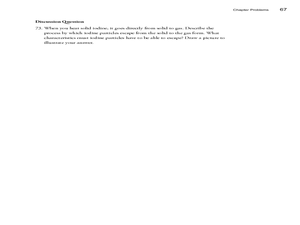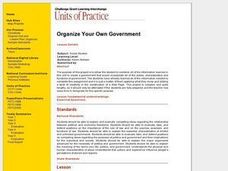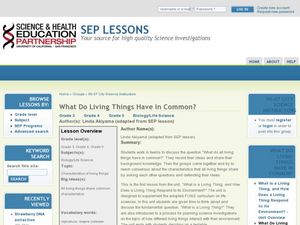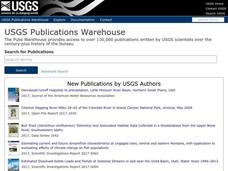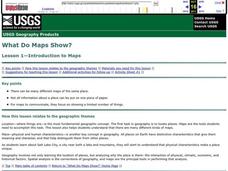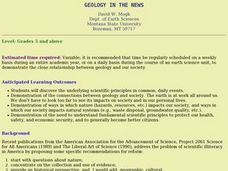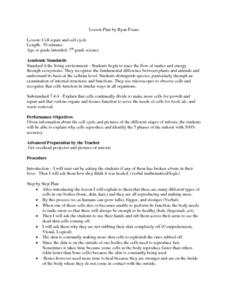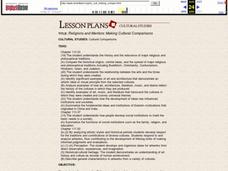Curated OER
English Vocabulary Skills: AWL Sublist 4 - Exercise 1a
In this online interactive English vocabulary skills worksheet, learners answer 10 matching questions which require them to fill in the blanks in 10 sentences. Students may submit their answers to be scored.
Curated OER
A Picture is Worth a Thousand Words: Public Views of Lincoln
Students write a letter in the voice of Abraham Lincoln. In this history lesson plan, students interpret the way the public viewed Lincoln during various times by examining political cartoons and images. Students write a letter in the...
Curated OER
Ah Choo!
Students compare bacteria to viruses to find the differences. In this biology lesson, students research viruses they have been inoculated against, using the Internet. Students complete a graphic organizer of their research on common...
Curated OER
The Structure of Matter and the Chemical Elements
In this chemistry worksheet, students answer 73 fill in the blanks and multiple choice questions on the structure of matter and properties of elements in the periodic table.
Curated OER
Student Designed Investigations: Observations
Students choose an organism and create an experiment with that organism. In this observation lesson, students expose a living thing to something from its environment and record their observations. Students must have some prior knowledge...
Curated OER
Ecosystem In A Bottle
Ecosystem activities show how everyone and everything is interconnected. The smallest change can make a big impact.
Curated OER
Alcohol Addiction and Its Effect on the Body
Ninth graders use the Internet to research the liver and the effects of alcoholism. In this alcohol addiction instructional activity students divide into groups and get information on their topic.
Curated OER
What Does Life Look Like Under a Microscope?
Students discover cells make up all living things. In this life science lesson, students investigate living organisms and the cells that create them. Finally the students create a testable question, conduct an investigation, and draw...
Curated OER
Organize Your Own Government
Pupils, in groups, design a government. They create a web page that describes the group's fictitious nation, details the citizen's culture, identifies the type of government and explores how the chosen government would respond to...
Curated OER
U.S. History: What Happened Here?
Students apply the global positioning system to create maps of local historical sites. By collaborating with local historical groups, they research events and relate them to broader, national history. In addition to writing essays...
Curated OER
Recipe for a Global Issue: India and South Asia
Students describe a political or social issue in India or South Asia metaphorically in the form of a recipe. In this lesson plan, students deconstruct a chosen issue, identify it's components and how it developed. They present their...
Curated OER
Student Designed Investigations Part 2 – Testable Questions, Predictions, Materials and Procedures
Learners create their own investigations. In this science experiments lesson, students use the steps of the scientific method to design an investigation. Learners share their findings on a poster.
Curated OER
What Do Living Things Have In Common?
Young scholars explore the concept of classification. In this classification lesson, students collaborate to create lists of living thing similarities in order to differentiate between living and non-living things. Young scholars create...
Curated OER
What Do Maps Show?
Students discover the uses for various types of maps. In this geography skills activity, students discuss the type of maps that exist and what their individual features are. Students then practice using different types of maps.
Curated OER
Introduction to Maps
Learners develop their map skills. In this geography lesson, students participate in an activity that requires them to survey their social studies book in order to find different types of maps and purposes for their uses.
Curated OER
Economics, Ecology, & Ethics
Pupils are introduced to the concepts of economics in a ethical way. In groups, they examine a shift in an economy and discover the effects of the shift. After reading an article, they evaluate it and they write their own conclusion to...
Curated OER
Geology in the News
Students discover the underlying scientific principles in common, daily events.
Curated OER
Notes on Cell Organelles
Middle schoolers record information and write journal entries on the structure and function of cell organelles while viewing a Powerpoint presentation.
Curated OER
Cell Repair and Cell Cycle
Seventh graders explore the cell cycle. They view pictures of different stages of mitosis and explain why cells reproduce. They identify the five phases of mitosis: interphase, prophase, metaphase, anaphase, and telophase.
Curated OER
Religions and Mentors: Making Cultural Comparisons
High schoolers compare the Tirthankara of Jain religious stories and compare it to mentors who appear throughout Western stories. Studentsl create a narrative or a portrait in honor of a mentor of his or her own.
Curated OER
Yin And Yang
Students examine the symbols of change, Heaven and Earth, as expressed in
Chinese art and literature in this High School lesson. Evaluation is accomplished through a short, small-group research project.





